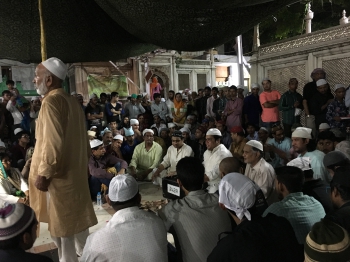10/31/2016
Traveling/living in India with young children
Our little trip in Europe helped me realize a big quality that Indians have, and it is a very big one: they love children. Which means, practically, that they do not look at you like you are about to commit some crime when you get on a train with your kid (who has not even opened his mouth but is already perceived as a source of trouble).
That they don’t throw nasty comments at you when, in an airport queue, you drop your smoothie trying to prevent your child from running away, and before you even have the time to take out a tissue to clean, “ah wonderful” (I told that old German hag to relax for the love of God).
That they don’t allow you to have dinner in their restaurant only under the condition that the child will remain sited and strapped in his highchair (no need to tell you that I went to another Scottish joint to have my fish & chips that day).
That there is little chances that an Indian hostess comes to tell you, after a one hour flight, that your baby has been “particularly painful” (he just screamed for 10 minutes but that same hostess wouldn't let me get up to distract him, because of the cart and her stupid rule that passengers can not sit on the floor below his seat even if the only thing he would thus disturb is the wall) and that “next time it would be better if the baby travelled in the economy class” (You're proud of you, aren’t you, Swiss Air bitch?).
That they will certainly try and distract your child on the plane if he is unsettled, or come to suggest feeding him if he is crying (it's a bit annoying that they explain any crying by hunger, but at least they try to help rather than push you further in your distress of mother-that-bothers-people).
That they will take him with them and their own children to let you “have breakfast in peace” at the restaurant. (You’re embarrassed, you don’t dare accepting, you give in and you are forever grateful to them for this little break.)
Sometimes it also gets a little extreme: it is not uncommon to see children in bars, late at night, with their parents. Or kids at the movies, watching adult films. But well, when you see how exposed to violence young Indian children can be through Indian mythology (full of violence, sex, betrayal) from an early age (see this post), you start thinking that an adult movie is not so bad.
 I kind of feel like that in Europe – and I confess I was like that before having a kid –babies are above all seen as a nuisance, a source of noise and inconvenience and you don't want to be next to one on the plane. Nor anywhere else. And maybe it’s a little sad. Children are the life, future, energy and innocence that we all lose a little growing up and that they give us back if we know how to watch them live and let them be. It’s also a little sad that people don’t even give them a chance to behave before thinking that they will ruin their happiness. But maybe I’m wrong...
I kind of feel like that in Europe – and I confess I was like that before having a kid –babies are above all seen as a nuisance, a source of noise and inconvenience and you don't want to be next to one on the plane. Nor anywhere else. And maybe it’s a little sad. Children are the life, future, energy and innocence that we all lose a little growing up and that they give us back if we know how to watch them live and let them be. It’s also a little sad that people don’t even give them a chance to behave before thinking that they will ruin their happiness. But maybe I’m wrong...
08:00 Posted in Expatriation (in India and in other countries), Little Samourai, My stories in India, Travelling (in India!) | Permalink | Comments (0) | Tags: india, europe, children, kids, babies, swiss air | ![]() Facebook | |
Facebook | |
09/12/2016
They may not be the most sportive people in the world but...
... Indians have a marathon on the top of the world!
(They claim it is the highest marathon in the world but according to the Records Guiness Book the Everest Marathon would be the highest). It is still something with a race at 5370m.
And for those who prefer cars... (Red Bull race in Ladakh in 2012):
08:00 Posted in Funny things about India in videos, Travelling (in India!) | Permalink | Comments (0) | Tags: india, ladakh, marathon, race, red bull, formula 1 | ![]() Facebook | |
Facebook | |
09/05/2016
Sufi chants in Nizamuddin, Delhi
If you don’t know what to do on Thursday in Delhi, and you survived the tour of Old Delhi, you are ripe for Nizamuddin! Nizamuddin is a Muslim neighborhood that houses the tomb of the namesake Saint as well as other hidden tombs, gems unknown to the public in which some families even squat.
If you have a little time, spawn yourself a passage in the crowd of people who are going to pay tribute to the Saint in the Nizamuddin Dargah – Thursday evening, prelude to Friday (sacred in Islam), is equally important. And wait patiently for 7:30 PM when they start singing sufis chants. But watch out. If you go there in the middle of August and it is not raining, prepare yourself to sweat water and blood (or almost). It’s hell hot and jammed-packed, you wouldn’t believe your eyes. And all these poor people you will come across in this neighbourhood, diseases probably eradicated in Europe, a lot of dirt also. It’s good though, it puts you back in another Indian reality you may tend to forget in your posh residence! Baby Samurai managed well also... Undisturbed by the climatic and crowdy contract with the Nepalese mountains we were just coming back from.
Despite the guide's (from delhibyfoot) explanations, I did not quite understand what thatt Nizamuddin Saint was special for except that he was a Sufi. Not that I understood well either what Sufism was about. But in short:
"Sufism is less a sect Islam than a mystical way of approaching the Islamic faith. It has been defined as “mystical Islamic belief and practice in which Muslims seek to find the truth of divine love and knowledge through direct personal experience of God.”. [… ]
General Characteristics: Sufi practices have their foundation in purity of life, strict obedience to Islamic law and imitation of the Prophet. Through self-denial, careful introspection and mental struggle, Sufis hope to purify the self from all selfishness. "Little sleep, little talk, little food" are fundamental and fasting is considered one of the most important preparations for the spiritual life. […]
Rituals: Prayers, Music and "Whirling". […] In the mid-9th century some mystics introduced sessions with music and poetry recitals (sama') in Baghdad in order to reach the ecstatic experience. Narcotics were used in periods of degeneration, coffee by the “sober” mystics (first by the Shadhiliyah after 1300). […]
Mystical sessions of music and poetry called sama (or sema) were introduced in Baghdad in the mid-9th century with the purpose of achieving an ecstatic experience. Narcotics have sometimes been introduced as part of the method, but this is considered a degeneration of the practice.”
Source: www.religionfacts.com/sufism
08:00 Posted in Funny things about India in photos, Funny things about India in videos, Travelling (in India!) | Permalink | Comments (1) | Tags: india, delhi, nizamuddin, dargah, sufi chants | ![]() Facebook | |
Facebook | |
















